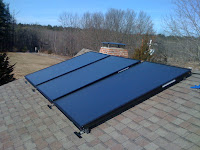Getting the right size for your space and need is important
when installing many different appliances and systems, including solar hot
water heater systems. When systems are not sized properly, you can suffer from
inefficiency and lack of supply. When sizing a solar hot water heater system,
here are the two main factors we consider,
Size of the solar collectors
In order for your new solar hot water heater system to
supply the amount of hot water you need, the system needs to have adequate
collector coverage. The collectors of solar hot water heater systems for homes
in Pennsylvania and New Jersey are typically sized as follows:
- 25 square feet of surface area is needed for a 2-person household
- For each additional family member, 12 to 14 square feet of collector surface area is necessary
Size of the storage tank
The storage tank of your solar hot water heater system holds
all the water heated by the solar energy that your collectors absorbed. In an
active system, you need 1.5 gallons of storage tank space per square foot of
collector area.
- In general, households of two people need storage tanks with a capacity between 40 and 50 gallons.
- 3 to 4-person households have tanks around 60 to 80 gallons.
- 5 to 6-person households need a storage tank of approximately 100 to 120 gallons.
- If your household has a higher demand for hot water, you should consider a storage tank the next size up.




